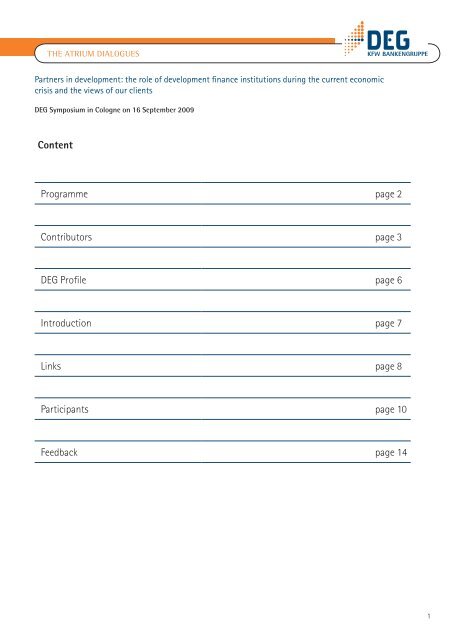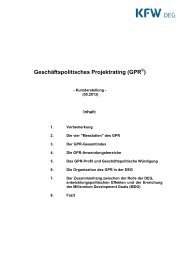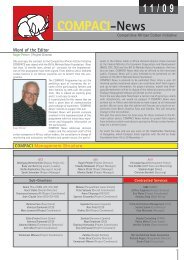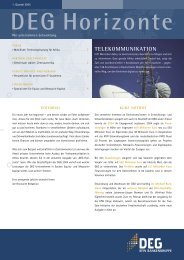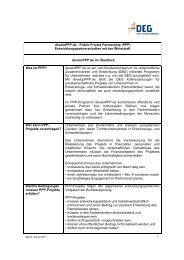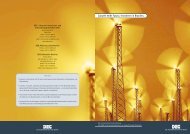We'd love to hear your thoughts. - DEG
We'd love to hear your thoughts. - DEG
We'd love to hear your thoughts. - DEG
Create successful ePaper yourself
Turn your PDF publications into a flip-book with our unique Google optimized e-Paper software.
The ATrium DiAlogues<br />
Partners in development: the role of development finance institutions during the current economic<br />
crisis and the views of our clients<br />
<strong>DEG</strong> Symposium in Cologne on 16 September 2009<br />
Content<br />
Programme page 2<br />
Contribu<strong>to</strong>rs page 3<br />
<strong>DEG</strong> Profile page 6<br />
Introduction page 7<br />
Links page 8<br />
Participants page 10<br />
Feedback page 14<br />
1
The ATrium DiAlogues<br />
Partners in development: the role of development finance institutions during the current economic<br />
crisis and the views of our clients<br />
<strong>DEG</strong> Symposium in Cologne on 16 September 2009<br />
Programme<br />
From 9.00 Check-in<br />
10.00 Welcome address and introduction Dr Winfried Polte, Chairman of the Board of Management of <strong>DEG</strong><br />
10.15 Causes of the economic crisis<br />
10.45 Discussion<br />
11.15 Coffee break<br />
11.30 Russian private banks during the crisis<br />
11.50<br />
12.10 Discussion<br />
12.30 Lunch<br />
13.45<br />
14.15 Discussion<br />
14.45<br />
15.05<br />
15.25 Discussion<br />
Agricultural finance during the crisis –<br />
the Latin-American experience<br />
Impact on the developing countries and<br />
necessary actions <strong>to</strong> be taken<br />
The market situation from the perspective<br />
of a producing company in Eastern Europe<br />
The market situation from the perspective<br />
of a producing company in Asia<br />
15.45 Coffee break<br />
16.00<br />
16.30 Discussion<br />
Co-ordinated initiatives taken by the<br />
development finance institutions<br />
17.00 Closing remarks<br />
17.15-18.00 Get-<strong>to</strong>gether (with food and beverages)<br />
Prof Rolf J. Langhammer, Vice President,<br />
Kiel Institute for the World Economy<br />
Prof Vasily Vysokov, Chairman of the Board of Direc<strong>to</strong>rs,<br />
Bank Center-Invest<br />
Benjamin Fernandez, Chief Executive Officer,<br />
Latin American Agribusiness Development Corporation S.A.<br />
Heidemarie Wieczorek-Zeul,<br />
Federal Minister for Economic Cooperation and Development<br />
Hans Peter Ingenillem, General Partner,<br />
Knauf Group<br />
Aloke Lohia, Group Chief Executive Officer,<br />
Indorama Ventures Limited<br />
Christian Grossmann, Direc<strong>to</strong>r of the Corporate Strategy<br />
Department, International Finance Corporation<br />
Nanno Kleiterp, Chief Executive Officer,<br />
Netherlands Development Finance Company (FMO)<br />
2
The ATrium DiAlogues<br />
Partners in development: the role of development finance institutions during the current economic<br />
crisis and the views of our clients<br />
<strong>DEG</strong> Symposium in Cologne on 16 September 2009<br />
Contribu<strong>to</strong>rs<br />
Host<br />
Hans Jessen<br />
Hans Jessen is a reporter, presenter and chief edi<strong>to</strong>r of the regional television news show ‘buten un binnen’ produced by the public<br />
broadcasting corporation Radio Bremen.<br />
He studied German language and literature, political science, sociology, psychology and education, qualifying as a teacher in 1979. After<br />
his degree, he initially worked as a journalist at ‘NDR-Zeitfunk’. In 1986, Mr Jessen started his career as an edi<strong>to</strong>r at Radio Bremen and<br />
became chief edi<strong>to</strong>r in 1990. During 1999 and 2006 he left Radio Bremen and served as a television correspondent at the ARD’s studio in<br />
the capital city of Berlin, where he mainly focused on foreign policy, development cooperation and environmental issues. Shortly after, he<br />
was appointed chief edi<strong>to</strong>r of the news show ‘Bericht aus Berlin’. In September 2006, Mr Jessen returned <strong>to</strong> Radio Bremen. Since then, he<br />
has been working as the chief edi<strong>to</strong>r and presenter of the regional television news show ‘buten un binnen’. He is also a member of an<br />
international training team. He has been organising courses in television journalism in Western and Eastern Europe since 1994 and has<br />
hosted numerous events concerning development cooperation.<br />
Speakers<br />
Dr. Winfried Polte<br />
Dr Winfried Polte is Chairman of the Board of Management of <strong>DEG</strong>.<br />
He was born in Sorau (Germany) in 1944. In his early years, he successfully completed an apprenticeship at Deutsche Bank and graduated<br />
from the University of Cologne with a doc<strong>to</strong>rate in economics and social sciences. After university, he worked as a project manager in the<br />
African Department at KfW Bankengruppe (KfW banking group) in Frankfurt am Main. In the following years, he gradually became<br />
division chief for North African countries, headed the Strategic Planning Department followed by the landbased infrastructure<br />
department of the export and project financing. Later he became Senior Vice President for Africa, the Middle East, Latin America and the<br />
Caribbean for the development cooperation. He has been Chairman of the Board of Management of <strong>DEG</strong> in Cologne since 2001.<br />
Prof. Rolf J. Langhammer<br />
Prof. Rolf J. Langhammer is Vice President of the Kiel Institute for the World Economy.<br />
Prof. Rolf J. Langhammer was born in Bad Wildungen (Germany) in 1947. He studied economics at Christian Albrecht University in Kiel,<br />
received his doc<strong>to</strong>rate in 1977 and was awarded several research fellowships and international professorships. In November 1995, he<br />
became an honorary professor in international economic relations and development economics at the Faculty of Economics, Business<br />
Administration and Social Sciences at Kiel University and headed the Development Economics and Global Integration research<br />
department at the Kiel Institute for the World Economy. He is Vice President since 1997 and pursued the position as acting President in<br />
2003/2004. In addition <strong>to</strong> that, Prof. Langhammer has served as a consultant <strong>to</strong> a number of international institutions (EU, World Bank,<br />
OECD, UNIDO, ADB) and <strong>to</strong> the German ministries of economic affairs and economic cooperation. His field of research covers trade<br />
patterns, trade policies, regional integration and international capital flows. He is also a member of the Scientific Advisory Council of the<br />
Federal Ministry for Economic Cooperation and Development, and has contributed <strong>to</strong> many professional journals and publications.<br />
3
The ATrium DiAlogues<br />
Partners in development: the role of development finance institutions during the current economic<br />
crisis and the views of our clients<br />
<strong>DEG</strong> Symposium in Cologne on 16 September 2009<br />
Prof. Vasily Vysokov<br />
Prof. Vasily V. Vysokov, who was born in Russia, is Chairman of the Supervisory Board of Center-invest Bank.<br />
From 1976 on, he studied economics at the State Institute of National Economy in Ros<strong>to</strong>v, before continuing his studies at Novosibirsk<br />
State University from 1982 on. In 1995, Prof. Vysokov graduated from the School of the Central Institute for Economics and Mathematics<br />
at the USSR Academy of Sciences and the Academy of International Ecology and Vital Activity. He has a PhD in economics. During his<br />
studies, he was an assistant professor, senior lecturer and associate professor at the Department of National Economic Planning at the<br />
Ros<strong>to</strong>v State Institute of National Economy. In 1991, he became Head of the Centre of Economic Assistance <strong>to</strong> market conversion at<br />
Ros<strong>to</strong>v Regional Administration, and in 1997 he served as General Direc<strong>to</strong>r of the Federal Fund for SME Support for one year in Moscow.<br />
In 1992, he was appointed Deputy Chairman and in 2002 he became Chairman of the Board of Direc<strong>to</strong>rs at JSC Center-invest Bank. To<br />
date, Prof. Vysokov has also published more than 200 works on economic problems and the development of SMEs in the South of Russia.<br />
Benjamin Fernandez<br />
Benjamin Fernandez is President and Chief Executive Officer of Latin American Agribusiness Development Corporation S.A. (LAAD).<br />
Benjamin Fernandez was born in Cuba of Spanish parents and raised in Asturias, Northern Spain. He emigrated <strong>to</strong> the United States of<br />
America <strong>to</strong> study and received a bachelor’s degree in business administration and accounting from Florida International University. He has<br />
also completed the advanced executive management programme at Harvard Business School and the executive management programme<br />
in strategy and organisation at Stanford Graduate School of Business.<br />
Before his career at LAAD began in 1976, Mr Benjamin Fernandez worked as an audi<strong>to</strong>r for two years at PricewaterhouseCoopers in<br />
Miami, USA. He also served on the board of Florida International Bankers Association (FIBA) and Gulliver Schools. In 1976, he started in<br />
development banking with LAAD as a staff accountant. He later became comptroller and also served as Vice President of Operations and<br />
Executive Vice-President. During his 33 years at LAAD and in development banking, he has successfully headed several projects and made<br />
significant contributions <strong>to</strong> the regional agribusiness development of Latin America.<br />
Heidemarie Wieczorek-Zeul<br />
Heidemarie Wieczorek-Zeul is the Federal Minister for Economic Cooperation and Development.<br />
Heidemarie Wieczorek-Zeul was born in Frankfurt am Main (Germany) in 1942. She studied his<strong>to</strong>ry and English and worked as a school<br />
teacher for ten years. During this time, she also started her political career as a member of the Social Democratic Party of Germany. In<br />
1968, she became a <strong>to</strong>wn councillor in Rüsselsheim. Six years later, she became Federal Chairperson of the SPD Youth Organisation<br />
‘Jungsozialisten’. She held this position for three years and has also served in the European Parliament for almost ten years. Mrs<br />
Wieczorek-Zeul has been a member of the German Bundestag (German parliament) since 1987. In 1998, she became Federal Minister for<br />
Economic Cooperation and Development.<br />
Hans Peter Ingenillem<br />
Hans Peter Ingenillem is a General Partner at the German Knauf Group.<br />
Mr Hans Peter Ingenillem is 64 years old and has an MBA. He started as the Head of Knauf Gips KG in 1991 and became Chief Financial<br />
Officer (CFO) in 2006. Mr Hans Peter Ingenillem has been Group Chief Officer since January 2008. Knauf is a family company which was<br />
established in 1932. In the course of its 70-year his<strong>to</strong>ry, the company has developed in<strong>to</strong> a global opera<strong>to</strong>r. The Knauf Group specialises in<br />
the production and distribution of building materials and systems.<br />
4
The ATrium DiAlogues<br />
Partners in development: the role of development finance institutions during the current economic<br />
crisis and the views of our clients<br />
<strong>DEG</strong> Symposium in Cologne on 16 September 2009<br />
Aloke Lohia<br />
Aloke Lohia is Group Chief Executive Officer of Indorama Ventures Limited.<br />
He is 50 years old and has a BA from the University of Delhi, India. Prior <strong>to</strong> Indorama Ventures Limited, he worked at the first Indorama<br />
enterprise – established by his father in Indonesia – for approximately ten years. In 1991, his wife joined the business and they moved <strong>to</strong><br />
Bangkok, Thailand, in 1998, where Mr Aloke Lohia founded Indorama Thailand. Mr Aloke Lohia is now Group Chief Officer at Indorama<br />
Ventures Limited, an enterprise dedicated <strong>to</strong> the consolidation and integration of the polyester value chain. The holding company is<br />
represented in Europe, Asia and the USA and is a global leader in the PET industry.<br />
Christian Grossmann<br />
Christian Grossmann is Direc<strong>to</strong>r of the Corporate Strategy Department at the International Finance Corporation (IFC).<br />
Christian Grossmann was born in Germany and has a degree in engineering from the Technical University (TU) in Munich, a Diploma of<br />
Economic Studies (CES) from the School of International Management in Paris and an MBA from INSEAD in Fontainebleau. Before joining<br />
the IFC, Mr Grossmann worked as an international management consultant in Europe, the United States and South Africa, and as an<br />
engineer in France and North Africa. After that, he held senior financial positions at Dresdner Bank Group in Paris, New York and Frankfurt.<br />
In 1998, he became a controller at IFC and from 2002 <strong>to</strong> 2006 he served in Moscow, primarily managing the Private Enterprise<br />
Partnership, IFC’s technical assistance activities in the countries of the former Soviet Union. Currently, Mr Grossmann is Direc<strong>to</strong>r of the<br />
Corporate Strategy Department at the International Finance Corporation in Washing<strong>to</strong>n, DC.<br />
Nanno Kleiterp<br />
Nanno Kleiterp is Chief Executive Officer at the Dutch development finance company FMO.<br />
Nanno Kleiterp is 56 years old and studied economics at the University of Groningen. At the beginning of his career, he worked in the<br />
private sec<strong>to</strong>r development in Nicaragua, Mexico and Peru. Mr Nanno Kleiterp joined FMO in 1987 and has since held a number of<br />
positions within FMO, including Manager of Small and Medium-Sized Enterprises, Regional Manager for Latin America, and Chief<br />
Financial Officer for Credit and Participations. In 2000, he also became responsible for FMO’s risk-bearing profile as Chief Investment<br />
Officer. He was appointed CEO and Chairman of FMO’s Management Board in 2008. He also represents FMO on the ProBanco Investment<br />
Committee, specialising in the financial sec<strong>to</strong>r in Central America.<br />
5
The ATrium DiAlogues<br />
Partners in development: the role of development finance institutions during the current economic<br />
crisis and the views of our clients<br />
<strong>DEG</strong> Symposium in Cologne on 16 September 2009<br />
<strong>DEG</strong> Profile<br />
<strong>DEG</strong>, member of KfW Bankengruppe, is one of the largest European development finance institutions for long-term project and company<br />
financing. For more than 45 years, <strong>DEG</strong> has been financing and structuring the investments of private companies in developing and<br />
transition countries.<br />
<strong>DEG</strong> invests in profitable projects that contribute <strong>to</strong> sustainable development in all sec<strong>to</strong>rs of the economy, from agriculture <strong>to</strong><br />
infrastructure and manufacturing <strong>to</strong> services. <strong>DEG</strong> also focuses on investments in the financial sec<strong>to</strong>r in order <strong>to</strong> facilitate reliable access<br />
<strong>to</strong> capital locally. To date, <strong>DEG</strong> has worked <strong>to</strong>gether with more than 1,500 companies and has committed financings of around 4.7 billion<br />
euros over the past five years alone.<br />
The aim is <strong>to</strong> establish and expand private enterprise structures in developing and transition countries, and thus create the basis for<br />
sustainable economic growth and a lasting improvement in the living conditions of the local population.<br />
The Mandate<br />
<strong>DEG</strong> provides long-term capital for private enterprises investing in those countries. <strong>DEG</strong> only takes on commitments in projects that make<br />
an effective development policy impact, meet environmental standards and comply with social principles. <strong>DEG</strong> is particularly committed<br />
<strong>to</strong> its developmental mandate and its guidelines for social and environmental compatibility: they form the decisive frame of operations.<br />
Development Policy Mandate<br />
Only successful and long-term viable private enterprises generate economic growth. They create jobs and income, contribute <strong>to</strong> improving<br />
the countries‘ foreign exchange balance by producing competitive products, contribute <strong>to</strong> government revenues by their tax payments and<br />
increase national value added by processing local resources. <strong>DEG</strong> fulfils its role as a development finance institution for the private sec<strong>to</strong>r<br />
in two ways: it is the reliable finance partner for enterprises that undertake investments and at the same time it focuses particular<br />
attention on these investments producing positive effects in the developing countries. The aim is <strong>to</strong> contribute <strong>to</strong> lasting economic<br />
growth in developing and emerging-market countries and improve the living conditions of the local population. <strong>DEG</strong> thus contributes <strong>to</strong><br />
the Millennium Development Goals, which are a joint commitment of industrial and developing countries <strong>to</strong> tackle poverty in a<br />
sustainable manner.<br />
<strong>DEG</strong>‘s promotion of private sec<strong>to</strong>r development pursues the following aims:<br />
• providing finance for direct investments as the least volatile segment of capital flows in<strong>to</strong> partner countries.<br />
• providing long-term loan finance <strong>to</strong> help safeguard cofinanced investment projects against crises.<br />
• helping <strong>to</strong> diversify capital flows by supporting pioneer inves<strong>to</strong>rs in new countries and regions.<br />
• and, as part of financial sec<strong>to</strong>r development, strengthen local capital markets so they can provide localized finance for investment<br />
projects, in particular for small and medium enterprises.<br />
In addition, <strong>DEG</strong> also mobilizes other partners and additional capital for investment projects. This way, <strong>DEG</strong> also helps maximize growth<br />
effects with low capital input.<br />
Environmental and Social Compatibility<br />
For <strong>DEG</strong>, environmental viability and sustainability as well as compliance with social standards are essential benchmarks of sustainable<br />
economic activity. Environmental and social compatibility involve protecting human lives and people’s health, their economic livelihood,<br />
the ecological, social and cultural environment as well as the sustainable use of natural resources.<br />
So <strong>DEG</strong> advises, finances and supports only enterprises that share these convictions and can provide evidence that their plant, processes,<br />
products and services meet environmental standards or that they are prepared <strong>to</strong> implement them in the future. This way <strong>DEG</strong> helps<br />
conserve the earth‘s natural resources and does its share <strong>to</strong> put the precept of environmental protection in<strong>to</strong> practice in developing and<br />
transition countries as well.<br />
6
The ATrium DiAlogues<br />
Partners in development: the role of development finance institutions during the current economic<br />
crisis and the views of our clients<br />
<strong>DEG</strong> Symposium in Cologne on 16 September 2009<br />
Introduction<br />
The effects of the financial and economic crisis on emerging markets and developing countries<br />
The negative effects of the current financial and economic crisis have now spread far beyond just the western industrialized nations.<br />
The recession is now having a global impact. This is because the international markets for goods, services and financial products are<br />
closely interlinked; many African and Asian countries are dependent on global market prices. After a short delay, the crisis has now<br />
reached the emerging markets and developing countries. At the end of June, the World Bank reduced its growth forecast for the poorer<br />
nations <strong>to</strong> just 1.2 percent. In 2008, this figure s<strong>to</strong>od at 5.9 percent. Added <strong>to</strong> this, the global economic crisis and the fragility of the<br />
financial markets are having a particularly drastic effect on flows of private capital in<strong>to</strong> the emerging markets and developing countries.<br />
According <strong>to</strong> World Bank estimates, this is likely <strong>to</strong> be around 363 billion dollars this year – less than a third of 2007’s record high of<br />
1.2 trillion dollars.<br />
Worsening conditions for financing<br />
The extent <strong>to</strong> which poorer nations suffer from the consequences of the crisis is dependent on how closely they are integrated in<strong>to</strong> the<br />
world economy.<br />
The financial markets in the emerging nations and the advanced developing countries are being hit particularly hard. According <strong>to</strong> the<br />
UN, s<strong>to</strong>ck market prices between January and Oc<strong>to</strong>ber 2008 crashed by around 40 percent in these countries. Hardest hit were Russia,<br />
with losses of 70.9 percent, and Ukraine, with 77.5 percent. One of the general problems has been that small and medium-sized<br />
enterprises in emerging markets are currently finding it extremely difficult <strong>to</strong> get credit from the banks. In addition <strong>to</strong> this, many<br />
entrepreneurs <strong>to</strong>ok up loans in euros or dollars before the crisis which they now can no longer repay because of the devaluation of their<br />
own currencies. Economists estimate that, in the emerging markets, loans of around 2 <strong>to</strong> 3 trillion dollars will be due in 2009.<br />
Decline of foreign trade<br />
To add <strong>to</strong> the considerably worsened financing conditions, the falling demand for export goods such as electronic products, clothing,<br />
games and <strong>to</strong>ys is also hitting the emerging markets and the advanced developing countries hard. China has already witnessed the<br />
closure of thousands of fac<strong>to</strong>ries. Around 20 million migrant workers have lost their jobs, according <strong>to</strong> official estimates. Similar trends<br />
are being observed in African countries such as the Democratic Republic of the Congo, Zambia and South Africa – all of which are<br />
dependent on the export of raw materials. The global decline in demand has led <strong>to</strong> cutbacks in production and company closures here <strong>to</strong>o.<br />
Reduced investment from abroad<br />
Developing markets are also experiencing a huge fall-off in the level of migrant workers’ remittances. According <strong>to</strong> the World Bank,<br />
these s<strong>to</strong>od at around 305 billion dollars in 2008. However, because of the economic downturn, the quantity of money flowing from<br />
migrant workers in the industrial nations back <strong>to</strong> their home countries has dwindled significantly. According <strong>to</strong> figures from the Inter-<br />
American Development Bank (IDB), transfers from migrants in Brazil (Latin America) and the Caribbean have already fallen by up <strong>to</strong> 11<br />
percent this year. This development is particularly deleterious <strong>to</strong> countries where money transfers from abroad make up a large part of<br />
the gross domestic product; for instance, Tajikistan, Moldova and Honduras.<br />
Private development finance institutions in demand<br />
To cope with the current bottlenecks in financing, emerging economies and developing countries are relying more than ever on the<br />
support of private development financers. Because it is right now that these economies need capital <strong>to</strong> ensure basic social services, <strong>to</strong><br />
realise development investments and <strong>to</strong> stabilise the finance sec<strong>to</strong>r. Which specific measures are suitable and what kinds of<br />
contributions private development financers and their partners can make is the subject of this year’s specialist conference ‘Partners in<br />
development – the role of development finance institutions during the current economic crisis and the views of our clients’ organised by<br />
<strong>DEG</strong> – Deutsche Investitions- und Entwicklungsgesellschaft mbH.<br />
7
The ATrium DiAlogues<br />
Partners in development: the role of development finance institutions during the current economic<br />
crisis and the views of our clients<br />
<strong>DEG</strong> Symposium in Cologne on 16 September 2009<br />
Links<br />
We are happy <strong>to</strong> provide you with some interesting web links that will give you further information on the conference <strong>to</strong>pics.<br />
<strong>DEG</strong>-Deutsche Investitions- und Entwicklungsgesellschaft mbh<br />
www.deginvest.de<br />
Kiel Institute for the World Economy<br />
http://www.ifw-kiel.de<br />
Bank Center-Invest<br />
http://www.centrinvest.ru<br />
Latin American Agribusiness Development Corporation S.A.<br />
www.laadsa.com<br />
Knauf Group<br />
www.knauf.com<br />
Indorama Ventures Limited<br />
http://www.indorama.net<br />
International Finance Corporation<br />
www.ifc.org<br />
Ministry of Economic Cooperation and Development<br />
www.bmz.de<br />
Netherlands Development Finance Company<br />
www.fmo.nl<br />
The Worldbank<br />
http://www.worldbank.org/financialcrisis/<br />
International Trade Site Alibaba.com (the world‘s largest online B2B marketplace)<br />
http://news.alibaba.com/article/list/1/financial-crisis.html<br />
Financial Times<br />
http://www.ft.com/indepth/global-financial-crisis<br />
Gazeta Internet Newspaper<br />
http://eng.gazeta.kz/art.asp?aid=135432<br />
DW World- Deutsche Welle<br />
http://www.dw-world.de/dw/article/0,,3689713,00.html<br />
8
The ATrium DiAlogues<br />
Partners in development: the role of development finance institutions during the current economic<br />
crisis and the views of our clients<br />
<strong>DEG</strong> Symposium in Cologne on 16 September 2009<br />
Economy Watch<br />
http://www.economywatch.com/economy-business-and-finance-news/A_his<strong>to</strong>ry_of_world_financial_crises_07-14.html<br />
International Monetary Fund<br />
http://www.imf.org/external/np/exr/key/finstab.htm<br />
Organisation for Economic Co-operation and Development<br />
http://www.oecd.org/department/0,2688,en_2649_33721_1_1_1_1_1,00.html<br />
http://www.oecd.org/document/24/0,3343,en_2649_201185_41707672_1_1_1_1,00.html<br />
Accessible Information on Development Activities<br />
http://aida.developmentgateway.org/AidaHome.do<br />
Global Issues- Social, Political, Economic and Environmental Issues that affect us all<br />
http://www.globalissues.org/article/35/us-and-foreign-aid-assistance<br />
German Development Institut<br />
http://www.die-gdi.de/CMS-Homepage/openwebcms3_e.nsf/(ynDK_contentByKey)/home?open&nav=expand:Home;active:Home<br />
http://www.die-gdi.de/CMS-Homepage/openwebcms3.nsf/(ynDK_contentByKey)/MSIN-7TBJTX/$FILE/BP%207.2009.pdf<br />
9
The ATrium DiAlogues<br />
Partners in development: the role of development finance institutions during the current economic<br />
crisis and the views of our clients<br />
<strong>DEG</strong> Symposium in Cologne on 16 September 2009<br />
Participants<br />
Surname Name Company Country<br />
Abouleish Helmy SEKEM Holding Investment Co. S.A.E. Egypt<br />
Adu Jr. Frank CAL Bank Limited Ghana<br />
Ahmala Jukka FINNFUND - Finnish Fund for Industrial<br />
Cooperation Ltd.<br />
Finland<br />
Akhundov Rauf OJSC Azerdemiryolbank Azerbaijan<br />
Akpofure Imoni IFC France<br />
Alvarado Hernan Danery Banco Centroamericano de Integracion<br />
Economica<br />
Honduras<br />
Alvarez Gonzalo J. Paveca Venezuela<br />
Asiedu-Antwi Michael PricewaterhouseCoopersGhana Ghana<br />
Azmy Tarek Corporate Leasing Company Egypt Corplease Egypt<br />
(S.A.E.)<br />
Beauvois John DBA Corporate Finance S.A. Uruguay<br />
Bercher Peter R. Erismann & Cie. GmbH Germany<br />
Berho Corona Lorenzo Corporacion Inmobiliara Vesta S. de R.L. de<br />
C.V.<br />
Mexico<br />
Besselmann Ingo B. Tönnies Fleischwerk Germany<br />
Bhagat Harkishan<br />
Bhikhubhai<br />
Vicfish Ltd. Tanzania<br />
Blomberg Björn Swedfund International AB Sweden<br />
Cacho Luis COFIDES - Compañia Española de<br />
Financiación del Desarollo<br />
Spain<br />
Clement-Davies Chris<strong>to</strong>pher Fulbright & Jaworski L.L.P. Great Britain<br />
Clewley Ross ZENITH CAPITAL LIMITED Nigeria<br />
Cravio<strong>to</strong> Garcia Rober<strong>to</strong> Altamira Terminal Portuaria Mexico<br />
Curwen Martin European Investment Bank Luxembourg<br />
De Muyter Alain BIO Société Belge d‘Investissement pour les<br />
Pays en Développement S.A.<br />
Belgium<br />
Demey Laurent PROPARCO - Société de Promotion et<br />
de Participation pour la Coopération<br />
Economique<br />
France<br />
Denner Joachim OBI Group Holding GmbH Germany<br />
Ekra Jean-Louis African Export-Import Bank S.A.E. Egypt<br />
El Tabgy Amal AIT Consulting Egypt<br />
10
The ATrium DiAlogues<br />
Partners in development: the role of development finance institutions during the current economic<br />
crisis and the views of our clients<br />
<strong>DEG</strong> Symposium in Cologne on 16 September 2009<br />
Ersdal Elin Norfund - Norwegian Investment Fund for<br />
Developing Countries<br />
Norway<br />
Esteve Eduardo A. Eco-Agroforestal S.A. Panama<br />
Felizati Adelmo Mangels Indústria e Comércio Ltda. Brazil<br />
Fendel, Prof. Dr. Ralf WHU Ot<strong>to</strong> Beisheim School of Management Germany<br />
Fritz-Morgenthal,<br />
Dr.<br />
Sebastian Frankfurt School of Finance & Management Germany<br />
Füchsel Harald Lufapak GmbH Germany<br />
Futalo Rostyslav ZAO SREI Leasing Russian<br />
Federation<br />
Gerth, Dr. André BioPlanta GmbH Germany<br />
Gnassingbe Gnékélé Banque Ouest Africaine de Développement<br />
(BOAD)<br />
Togo<br />
Goeb Eva ECOM Agroindustrial Corp. Ltd. Switzerland<br />
Hägele Klaus SIAG Schaaf Industrie AG Germany<br />
Hagmann Andrea Oesterreichische Entwicklungsbank AG Austria<br />
Hahn, Dr. Ot<strong>to</strong>kar European Business Congress Germany<br />
Harms, Prof. Dr. Philipp RWTH Aachen University Germany<br />
Hermans Philippe BMI-SBI Société Belge d‘Investissement<br />
International - Belgische Maatschappij<br />
Belgium<br />
Hummel Siegbert Metabo AG Germany<br />
Hummel, Dr. Matthias KfW Entwicklungsbank Germany<br />
Jorgensen Lorenz European Bank for Reconstruction and<br />
Development<br />
Great Britain<br />
Kassam Lutaf Industrial Promotion Services Kenya Ltd. Kenya<br />
Kassar Adel Fransabank S.A.L. Lebanon<br />
Kassar Adnan Fransabank S.A.L. Lebanon<br />
Kassidova Sophia Black Sea Trade and Development Bank Greece<br />
Kessler Dietmar PCC SE Germany<br />
Kidiwa Vic<strong>to</strong>r J.O. Development Bank of Kenya Ltd. (DBK) Kenya<br />
Kohleick Reinhard Quadriga Capital Russia Private Equity Fund Russian<br />
II L.P.<br />
Federation<br />
Kollatz-Ahnen Matthias European Investment Bank Luxembourg<br />
Kumagai Yoshihiro Japan Bank for International Cooperation Germany<br />
Lacayo Carlos Reynaldo Importadora y Distribuidora OCAL S.A. Nicaragua<br />
Lacayo César A. Importadora y Distribuidora OCAL S.A. Nicaragua<br />
Lindlein, Dr. Peter iCee international Consulting economists Germany<br />
11
The ATrium DiAlogues<br />
Partners in development: the role of development finance institutions during the current economic<br />
crisis and the views of our clients<br />
<strong>DEG</strong> Symposium in Cologne on 16 September 2009<br />
Mantero Francisco SOFID - Sociedade para o Financiamen<strong>to</strong> do<br />
Desenvolvimen<strong>to</strong><br />
Portugal<br />
Matlala Joyce Kagiso Trust Investments (Pty) Ltd. South Africa<br />
Meyer Gerd Deutsche Bank AG Luxembourg<br />
Meyer Jan Chris<strong>to</strong>ph Vestas Central Europe Germany<br />
Mira Amaral Luis Fernando Banco BIC Portugues, S.A. Portugal<br />
Mulder Gert Jan DBA Corporate Finance S.A. Uruguay<br />
Ogunsulire Kolade ZENITH CAPITAL LIMITED Nigeria<br />
Olatunji Adesoye Rawhhurr Mutual Benefits Assurance Plc Nigeria<br />
Olufowose Ebenezer Access Bank Plc Nigeria<br />
Ortuño de la<br />
Goublaye<br />
Gaspar Compañia Inversionista Las Brisas S. A. Costa Rica<br />
Ot<strong>to</strong> Hans GOPA Consultants Germany<br />
Ot<strong>to</strong>lenghi Daniel European Investment Bank Luxembourg<br />
Ousmane Mey Alamine Afriland First Bank Cameroon<br />
Owiredu Philip CAL Bank Limited Ghana<br />
Pellerin Thomas IFC France<br />
Pirivatric Vladan Energoprojekt Holding a.d. Serbia<br />
Pohlenz Angelika ICC Deutschland (Internationale<br />
Handelskammer)<br />
Germany<br />
Poncon Eric ECOM Agroindustrial Corp. Ltd. Mexico<br />
Pyl Nico K.G. Nederlandse Financierings-Maatschappij<br />
voor Ontwikkelingslanden N.V. (FMO)<br />
Netherlands<br />
Quartiero Jairo Camil Alimen<strong>to</strong>s S.A. Brazil<br />
Quartiero Luciano Camil Alimen<strong>to</strong>s S.A. Brazil<br />
Reed Steven L. Inter-American Investment Corporation USA<br />
Reinhardt, Dr. Horst Landwirtschaftliche Rentenbank Germany<br />
Rixen Jan EDFI European Development Finance<br />
Institutions<br />
Belgium<br />
Romeo García Remedios COFIDES - Compañia Española de<br />
Financiación del Desarollo<br />
Spain<br />
Römer Max W. Quadriga Capital Beteiligungsberatung<br />
GmbH<br />
Germany<br />
Romero Iglesias Manuel S.A. Molinos Arroceros Nacionales Uruguay<br />
Saravia Molina Alejandro Agribusiness Financial Consulting Costa Rica<br />
Schmitz LL.M. Almut NRW International Germany<br />
Schütte, Dr. Clemens Messe Düsseldorf GmbH Germany<br />
12
The ATrium DiAlogues<br />
Partners in development: the role of development finance institutions during the current economic<br />
crisis and the views of our clients<br />
<strong>DEG</strong> Symposium in Cologne on 16 September 2009<br />
Sedjro Yaovi Ayao FONDS GARI Togo<br />
Sham Sarit Suresh Raja I&M Bank Limited Kenya<br />
Sieberth Kai Cobana Fruchtring GmbH & Co.KG Germany<br />
Siemens Oltmann G. Oxford Analytica Great Britain<br />
Singhal Sanjiv BanyanTree Finance Private Limited India<br />
Singharay Hiren Standard Chartered Bank Great Britain<br />
Sisoskvili Sergey Transcapitalbank Russian<br />
Federation<br />
Skurtis Thomas PROPARCO - Société de Promotion et<br />
de Participation pour la Coopération<br />
Economique<br />
France<br />
Steffens, Prof. Dr. Udo Frankfurt School of Finance & Management Germany<br />
Stirling Alfredo DBA Corporate Finance S.A. Uruguay<br />
Templier Hélène PROPARCO - Société de Promotion et<br />
de Participation pour la Coopération<br />
Economique<br />
France<br />
Toure Bassary Banque Ouest Africaine de Développement<br />
(BOAD)<br />
Togo<br />
Uranta, Dr. J. Clin<strong>to</strong>n Niger Insurance Plc Nigeria<br />
Vanderstraeten Yves SOCFINCO S.A. Belgium<br />
Vandfplas Erna BMI-SBI Société Belge d‘Investissement<br />
International - Belgische Maatschappij<br />
Belgium<br />
von Werne Volker Alfred C. Toepfer International GmbH Germany<br />
Vrankovic Neven Atlantic Grupa d.d. Croatia<br />
Wancata Michael Oesterreichische Entwicklungsbank AG Austria<br />
Watson Carlos Banco Centroamericano de Integracion<br />
Economica<br />
Honduras<br />
Wille Reinhard GEA Group AG Germany<br />
Wilmès, Prof. Philippe BMI-SBI Société Belge d‘Investissement<br />
International - Belgische Maatschappij<br />
Belgium<br />
Wong N. Rafael S. REYBANPAC Ecuador<br />
Zecevic Miodrag Energoprojekt Holding a.d. Serbia<br />
Zoellner Claus Ost- und Mitteleuropa Verein e.V. Germany<br />
13
The ATrium DiAlogues<br />
We’d <strong>love</strong> <strong>to</strong> <strong>hear</strong> <strong>your</strong> <strong>thoughts</strong>.<br />
Please take a few minutes of <strong>your</strong> time and let us know <strong>your</strong> opinion on <strong>to</strong>day’s conference. Your answers will help us <strong>to</strong> improve<br />
future events and tailor them more precisely <strong>to</strong> <strong>your</strong> wishes. You can return the completed form at the check-in counter, or you can<br />
fax it <strong>to</strong> us using the following fax number: +49 (0)221 4986-1292.<br />
Thank you for <strong>your</strong> support.<br />
1. How satisfied are you with the event overall?<br />
q Extremely satisfied q Very satisfied q Satisfied q Less than satisfied q Dissatisfied<br />
2. How important is it <strong>to</strong> you <strong>to</strong> be able <strong>to</strong> take part in an event like the <strong>DEG</strong> conference?<br />
q Extremely important q Very important q Important q Somewhat important q Unimportant<br />
3. Did you participate in “Act responsibly – why CSR pays off. Companies report on first-hand experiences”,<br />
the first conference from the series “The Atrium Dialogues”?<br />
q yes q no<br />
4. How do you rate the balance between information and discussion? Would you have preferred <strong>to</strong> receive more information<br />
or would you rather have had more discussions during this event?<br />
q Much more information<br />
q A little more information<br />
q Balance of information and discussion was just right<br />
q A little more discussion<br />
q Much more discussion<br />
5. How interested were you in the <strong>to</strong>pics being presented at the conference?<br />
q Extremely interested q Very interested q Interested q Somewhat interested q Disinterested<br />
6. How satisfied were you with the following aspects of the event?<br />
Extremely satisfied Very satisfied Satisfied Less than satisfied Dissatisfied<br />
Location 1 2 3 4 5<br />
Atmosphere 1 2 3 4 5<br />
Organisation 1 2 3 4 5<br />
Support and service 1 2 3 4 5<br />
14
The ATrium DiAlogues<br />
7. Now <strong>to</strong> the particulars of the conference:<br />
How satisfied were you … Extremely satisfied Very satisfied Satisfied Less than satisfied Dissatisfied<br />
… with the presentations? 1 2 3 4 5<br />
… with the handouts and materials? 1 2 3 4 5<br />
… with the modera<strong>to</strong>r? 1 2 3 4 5<br />
8. What did you especially enjoy about the event?<br />
______________________________________________________________________________________________________________<br />
______________________________________________________________________________________________________________<br />
______________________________________________________________________________________________________________<br />
______________________________________________________________________________________________________________<br />
______________________________________________________________________________________________________________<br />
9. Was there anything in particular about the event that you disliked?<br />
Do you have any additional comments or suggestions as <strong>to</strong> how the next event could be improved?<br />
______________________________________________________________________________________________________________<br />
______________________________________________________________________________________________________________<br />
______________________________________________________________________________________________________________<br />
______________________________________________________________________________________________________________<br />
______________________________________________________________________________________________________________<br />
15


